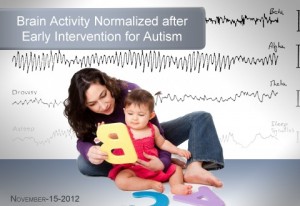Check out other stories from the Latest News
Brain Activity Normalized after Early Intervention for Autism
By Chelsea E. Toledo, M.A. on November 15, 2012

Background: Autism Spectrum Disorder (ASD) can be diagnosed in children as young as 18 months old. Research has shown that earlier interventions for ASD, such as the Early Start Denver Model (ESDM), are associated with better outcomes, including improved IQ, language, and adaptive behaviors like recognizing faces.
What’s New: In a report published in the November 2012 issue of the Journal of the American Academy of Child & Adolescent Psychiatry, researchers detail an additional improvement conferred by ESDM: a better response to stimuli by the brain’s prefrontal cortex. The scientists used electroencephalography (EEG)—a test that measures electrical activity along the scalp—on children between 18 and 30 months of age. Of the 48 participants with ASD, half received ESDM intervention, and the other half received referred therapies through child development programs and individual providers. After two years, the cortical activity of the ESDM group approximated that of children without ASD when they were shown images of faces.
Why it’s important: The findings demonstrate that the brains of children with ASD can process social stimuli in a typical manner when the disorder is addressed early in life using the ESDM. Thus, the severity of ASD can possibly be allayed by way of early intervention.
Help me understand :
| Source(s) : |
| Tweet |

